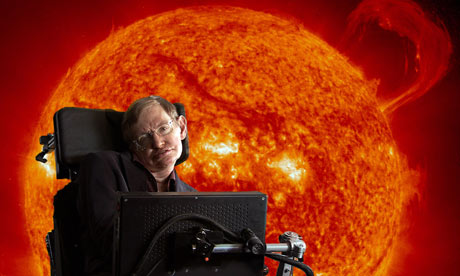
A belief that heaven or an afterlife awaits us is a “fairy story” for people afraid of death, Stephen Hawking has said.
In a dismissal that underlines his firm rejection of religious comforts, Britain’s most eminent scientist said there was nothing beyond the moment when the brain flickers for the final time.
Hawking, who was diagnosed with motor neurone disease at the age of 21, shares his thoughts on death, human purpose and our chance existence in an exclusive interview with the Guardian today.
The incurable illness was expected to kill Hawking within a few years of its symptoms arising, an outlook that turned the young scientist to Wagner, but ultimately led him to enjoy life more, he has said, despite the cloud hanging over his future.
“I have lived with the prospect of an early death for the last 49 years. I’m not afraid of death, but I’m in no hurry to die. I have so much I want to do first,” he said.
“I regard the brain as a computer which will stop working when its components fail. There is no heaven or afterlife for broken down computers; that is a fairy story for people afraid of the dark,” he added.
You can read the full interview here. There is more to read, so go check it out.
So what happened last time? Well, within his 2010 book, The Grand Design, Professor Hawking had written that there is no need for a creator to explain the existence of the universe. This caused a bit of a storm. For example the chief rabbi Lord Sacks hit back and suggested that this was an “elementary fallacy” of logic. (You can read about that here). He claimed:
There is a difference between science and religion. Science is about explanation. Religion is about interpretation. The Bible simply isn’t interested in how the universe came into being. But there is more to wisdom than science. It cannot tell us why we are here or how we should live. Science masquerading as religion is as unseemly as religion masquerading as science”
Sigh! … there is indeed an “elementary fallacy” of logic here, but it is not being made by Stephen Hawking, but rather by Lord Sacks. Given the latest interview, I suspect we can now expect more of the same, so lets take a few moments to consider it.
- A very long time ago, the bible was once the best set of answers we had. It contains our primitive attempts to understand the world around us and what it was all about. We now have better answers and a better understanding, so this older more primitive understanding can now be discarded.
- Relying on primitive bronze age texts to tell us why we are here, or how we should live is truly not the best approach, there is a far better way of achieving this, the discipline for doing that is called philosophy. Remember this is a text that describes a jealous supernatural entity motivating his chosen to embark upon a campaign of ethnic cleansing. It also gives you guidance on whom you can and cannot buy slaves from, how you should sell your daughter into slavery, and the list of crimes that merit stoning – is he seriously recommending this as a handbook on how we should live today? (tragically, he truly is)
His claim that science is masquerading as religion is of course nonsense. However, the thought that religion often attempts to masquerade as science is correct, examples of that abound and include creationism, anti-evolution and intelligent design.
Oh and one final thought, who would you rather trust, one of the smartest theoretical physicists and cosmologists of our age, or a Rabbi whose sole basis of authority on this matter is that he has an imaginary supernatural friend that he truly believes to be real? – I suspect you can guess my answer, and hopefully your answer is the same.